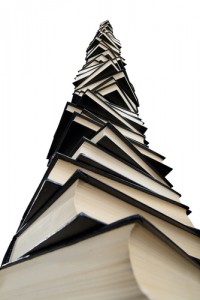Choosing a book to read based on its length
Choosing a book to read based on its length
Choosing a book to read based on its length
-
Hannah
-
Hannah
Picture the scene:
 It’s a quiet Saturday in your local town, and the heavens have opened. Thankfully, you’re near your favourite book store, so you hurry there. Shaking off the water drops on the doormat, you consider your options: 1) wait at the door until the rain lessens, 2) do a little browsing, or 3) start scouting seriously for a new book. Option 1 is clearly out: it feels sacrilegious to be in a book store and not even look. Option 2 is sensible, but not remotely as fun as Option 3… You tell yourself that, just like calories you drink rather than eat don’t count (think frothy cappuccinos), purchases of books – those wonderful, diverting, educative friends – are never naughty, only ever nice. You reach for a basket and start looking.
It’s a quiet Saturday in your local town, and the heavens have opened. Thankfully, you’re near your favourite book store, so you hurry there. Shaking off the water drops on the doormat, you consider your options: 1) wait at the door until the rain lessens, 2) do a little browsing, or 3) start scouting seriously for a new book. Option 1 is clearly out: it feels sacrilegious to be in a book store and not even look. Option 2 is sensible, but not remotely as fun as Option 3… You tell yourself that, just like calories you drink rather than eat don’t count (think frothy cappuccinos), purchases of books – those wonderful, diverting, educative friends – are never naughty, only ever nice. You reach for a basket and start looking.
Fifteen minutes later, you’re trying to choose between two romance novels. You’ve compared covers. You’ve compared blurbs. You’ve compared first pages. You’ve compared prices. What next? You turn the books on end, of course, and compare the thickness. Which is the longer book? It’s a crucial question for most book buyers…
How important is book length to you? Which do you prefer – short books or long books? Do you read a mix of both? Do you deliberately stick to quick-grab reads, and embrace the recent renaissance of the novella? Or do you shy away from anything too succinct and seek out weighty tomes that will keep you going for a good while?
Most readers have a preference. Personally, I tend to gravitate toward longer reads. I love the weight of the book in my hands. I love knowing that the story is that detailed, that sustained. I love to start on page one knowing that there’s a long journey ahead, and I love the feeling of accomplishment when I finish. For me, there is something infinitely comforting about a long book.
Some readers take the ‘bigger is best’ approach to the extreme and seek out the longest books for their collections, so-called ‘literary doorstops’. The Guardian recently suggested ten of the best long reads: The Goldfinch, Donna Tartt; The Luminaries, Eleanor Catton; A Suitable Boy, Vikram Seth; Cedilla, Adam Mars-Jones; Middlemarch, George Eliot; Underworld, Don DeLillo; My Struggle, Karl Ove Knausgaard; In Search of Lost Time, Marcel Proust; 2666, Roberto Bolaño; Infinite Jest, David Foster Wallace. Other than the Bible, Proust’s In Search of Lost Time is the longest book ever written, with a staggering 1,200,000 words (which makes my 105,000-word novels seem like very quick reads in comparison!). Two other long reads I highly recommend are Les Misérables by Victor Hugo (531,000 words) and War and Peace by Tolstoy (587,000 words).
For readers of romance who like a simpler, shorter read, the publishers Harlequin and Mills & Boon have imprints particularly tailored for slim books – around 35,000 words. Even I can appreciate the quick escapism afforded by a short book such as this, and the writing quality and poignancy of the story can be just as good.
What do you think? Is there room in the market for all lengths of books? Would you like to see more books published at either end of the spectrum? What’s your ideal length of book? Are you happy to see that the revolution in self-publishing is opening the door to all kinds of lengths of books, from novelettes to epics?
I would love to hear your thoughts.